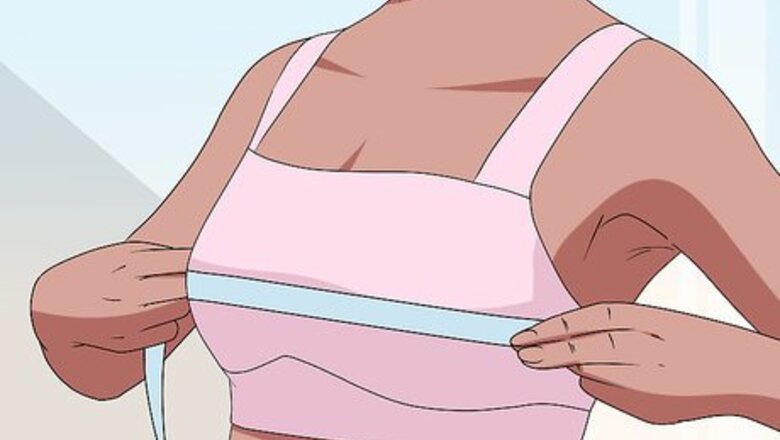
views
Measuring and Cutting out the Bikini Top Front
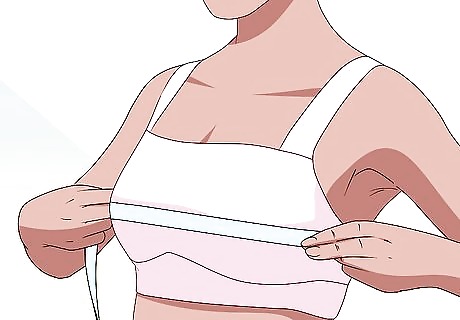
Take your front bust measurement. Hold one end of a measuring tape at the far side of your bust. This is where the outside edge of your bra cup is positioned. Place the tape horizontally across the fullest part of your bust until you reach the outside edge of your bust on the other side. Make note of the length; this will be your front bust measurement. Remember to stand upright, keep the tape measure parallel to the ground, and be sure your elbows are held close to your body. Avoid lifting your arms as this will distort the measurement. To get the most accurate measurement, have someone assist you.
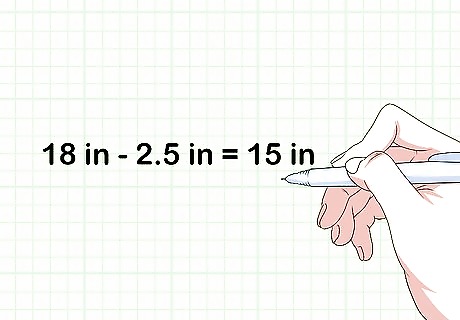
Subtract 2 to 4 in (5.1 to 10.2 cm) to determine the bikini top's front width. The amount you subtract will vary based on your bust size and how tight you want the top to be. It should also incorporate a narrow ⁄4 in (0.64 cm) seam allowance. For a smaller bust or tighter fit, subtract 4 in (10 cm). For a larger bust or looser fit, subtract 2 in (5.1 cm). This number will become the width of the two cups when measured horizontally across the front of your bust. Consider this your bikini top's front width measurement. For example, if your front bust measurement is 18 in (46 cm) and you have a moderately sized bust, you might decide to subtract 2 ⁄2 in (6.4 cm). Your finished bikini top's front width will be 15 in (38 cm), plus the ⁄4 in (0.64 cm) seam allowance on both sides. If you prefer to use a wider seam allowance, just add this into your measurement. You can also draw in both the finished line (which is where you'll sew, and indicates the edges of the finished garment) as well as the cut line (which includes the seam allowance) if you wish.
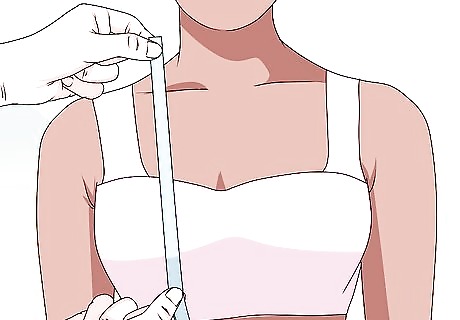
Determine your bikini top's height, based on the coverage you want. This measurement will typically be at least 5 to 7 in (13 to 18 cm) when finished, plus ⁄4 in (0.64 cm) seam allowance. It depends on your bust size and how much coverage you want. If you have a larger bust or desire more coverage, more height will give you fuller coverage. If you have a smaller bust or desire less coverage, go with a lower height measurement. If you're not sure, measure the height of your favorite bra or bikini top for reference. Then, add ⁄4 in (0.64 cm) for seam allowance around all sides.
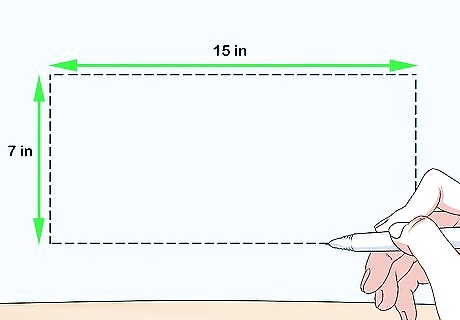
Draw a rectangle on your fashion fabric using width and height measurements. Place fashion fabric (the material you'll use for the outer part of the bikini) with its right-side facing down onto a flat surface. Use a ruler and a fabric marking pencil or chalk to draw a rectangle onto the wrong side of the fabric. Its dimensions will be your bikini top's front width by height. For example, if you determined a top length of 15 in (38 cm) and desire 7 in (18 cm) of height, your rectangle will measure 15 by 7 in (38 by 18 cm). When selecting your fashion fabric, the best choice is something that's specifically marketed for use in swimwear, since it will provide the right amount of stretch, water absorption, and colorfastness. Try searching under the performance fabric category of a few online fabric stores to find your favorite print. If your fabric has a stripe or other printed pattern, position your pattern pieces in the correct orientation out so that the design will appear upright once the garment's finished. You wouldn't want sideways zebra stripes or upside-down letters, after all! If there is a particular motif you want visible on the swimsuit, such as a large flower, center your pattern piece around that.
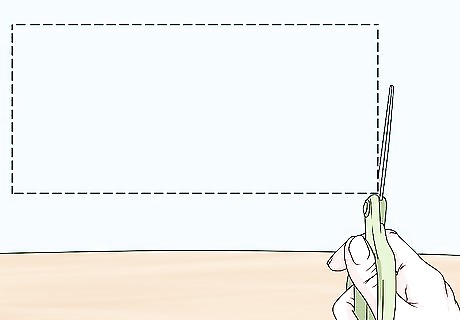
Cut out this rectangle with fabric scissors. Use sharp fabric scissors to achieve a clean line while cutting. Since you're cutting a stretch fabric, be careful not to stretch it out or snag the edges. This piece will become the outer portion of your bikini top.
Making a Pattern for the Bikini Top Lining and Ties
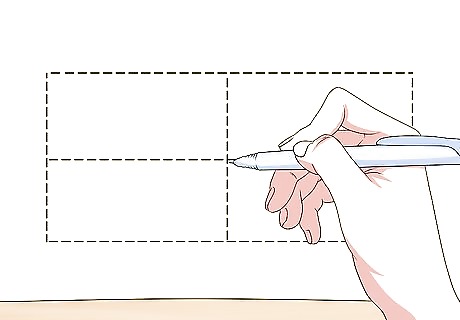
Draw an identical rectangle onto your lining fabric and mark the center. Mark out the same dimensions onto the wrong side of your lining fabric as you used for your fashion fabric. Draw a vertical line in the horizontal and vertical center of this rectangle, roughly 3 in (7.6 cm) tall. Your outer fabric will be gathered down to this dimension later on. If you want it to be gathered more tightly or more loosely, shorten or lengthen this vertical line accordingly. For lining fabric, use something of a similar quality and fiber content to your fashion fabric in a solid color. Look under the performance fabrics category to find swimwear lining fabrics, which are typically poly-spandex and sold in black, white, and nude shades.
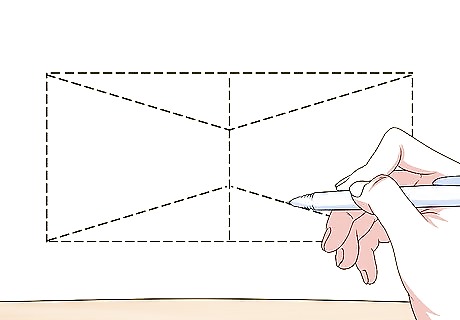
Draw a “bowtie” shape by connecting the rectangle's corners to the center mark. Draw diagonal lines from each corner that connect to the top and bottom of this vertical center line. The resulting shape will feature 2 triangles that appear flattened at the center mark. Each triangle will cover 1 side of your bust.
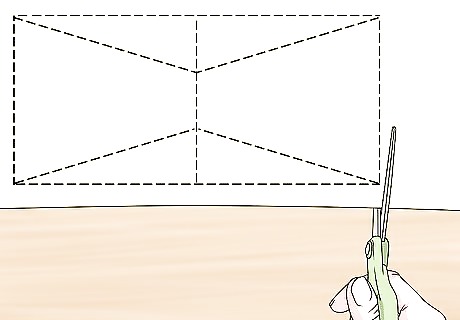
Cut out the lining fabric along the “bowtie” lines. Using fabric scissors, carefully cut along the marked lines of your lining fabric. Instead of cutting out the whole rectangle, follow the diagonal lines so you have a “bowtie” shape. Discard the excess triangle-shaped fabric scraps from the top and bottom of this piece.
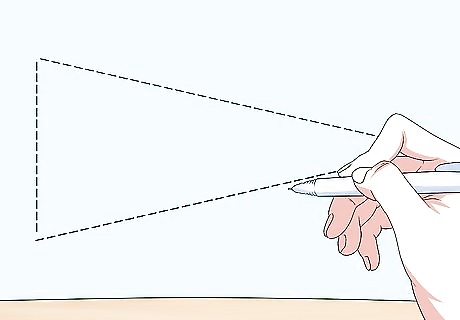
Draw out 1 of the back ties, starting with the height measurement. To create left and right pieces for the back of your bikini top, you'll draw out a few pieces onto your main fabric in the shape of long and narrow right triangles. Use the dimension of the bikini top's height to start. The back pieces will later be sewn to the bikini top front at the side seam, so it's important that the heights match. You've cut out the pieces for the front half of your bikini top, but the back ties will complete the band that goes all the way around your torso. The loose ends will be knotted at center-back when it's finished. If you determined a top height of 7 in (18 cm) and a length of 15 in (38 cm), Each back tie piece will measure 7 by 15 in (18 by 38 cm). Combined, the back ties will be 30 in (76 cm) wide which allows plenty of fabric for tying a knot.
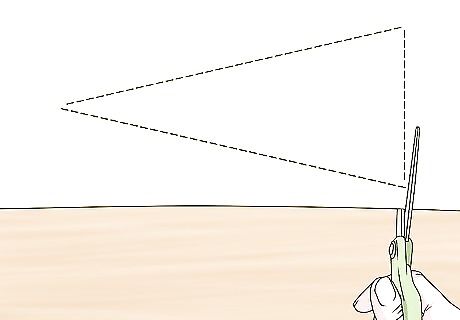
Complete the back pattern piece in the shape of a right triangle. From the base of the height line you just drew, extend a line out perpendicularly, to create a right angle. This new line should be the same measurement as your bikini top's front width. This way, both ties will be long enough to knot at the center-back when you wear the bikini. With a ruler, connect the ends of these 2 lines and draw in the hypotenuse to complete the triangle. Cut this piece out with fabric scissors.
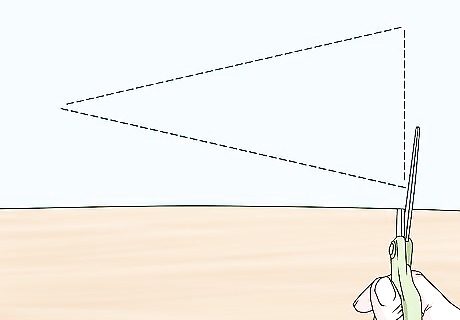
Cut 1 more back tie piece that mirrors the first. Once you've completed the first triangular back piece, make another in the same dimensions but mirrored. For example, if the first piece you drew was for the right side of the back, the second piece will be a mirror image, used for the left side of the back. Cut this piece out. Make sure these triangles are mirror images of each other. You will use one for the right side of your bikini top and one for the left.
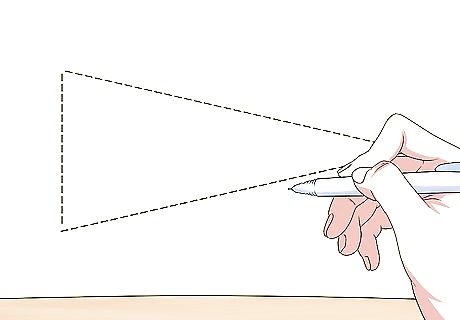
Draw 2 identical triangles to create self-lining pieces for the back. You'll add lining to these back ties which will provide extra support as well as a cleaner finish around the edges. For the linings, cut the same long, narrow right triangle shapes out of your fashion fabric, instead of the lining fabric. When the ties are knotted at center-back, the underside might be visible so you won't want to use the lining material for this.
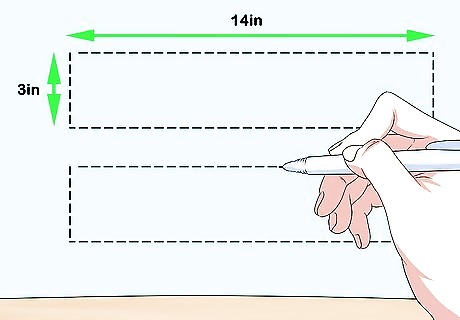
Mark and cut out 2 halter straps. Draw 2 long, narrow rectangles on the wrong side of your fashion fabric, each measuring about 3 in (7.6 cm) wide. These should be at least 14 in (36 cm) long, or long enough to reach from the bikini top to tie as a halter around your neck. Cut out each strap with fabric scissors. If you would like more supportive straps, increase their width. Taper the top ends if you'd like an elegant finish. You can create a rounded or notched finish right at the very end, or gradually taper the straps down to a point starting a few inches back. The bottom ends need to remain the original width as you'll be securing them to the bikini top.
Constructing the Bikini Top
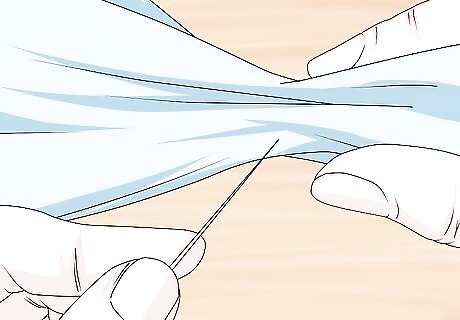
Gather the center front of your bikini top. Mark a vertical center line on the wrong side of your outer bikini top fabric. Hand sew a gathering stitch along this center line using a strong thread and long, straight stitches. Adjust the volume of this gathered piece so that it's the same width as the narrow center part of the bikini top lining. Sew over your gathers on the machine using a straight stitch for reinforcement. If the center of your “bowtie” lining piece is 3 in (7.6 cm) tall, gather the outer piece down to 3 in (7.6 cm).
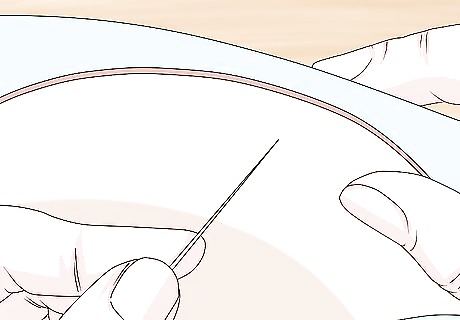
Sew pads into the bikini top lining. Pin premade bust pads or soft molded cups to the wrong side of your lining fabric. Position the cups so they're centered on either triangular half of the lining. Sew them in on the machine, using a ⁄8 in (0.32 cm) zigzag stitch around the edges. Trim the pads or cups down to size using craft scissors, if necessary. They should not extend into the center or over the edges of the lining. Whatever padding you use, make sure it will tolerate water and machine washing.
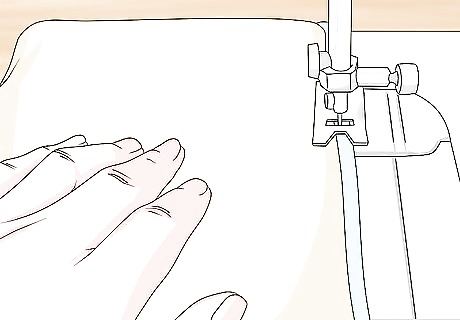
Sew the padded lining into the outer bikini fabric. With right sides together, match up the fashion fabric and lining fabric along the edges, ⁄8 in (0.32 cm) away from the cut edge. Pin them in place, then sew along the top and bottom edges only with a machine straight stitch. Then, turn the pieces so that the right sides face outward. Do not sew a side seam at this point.
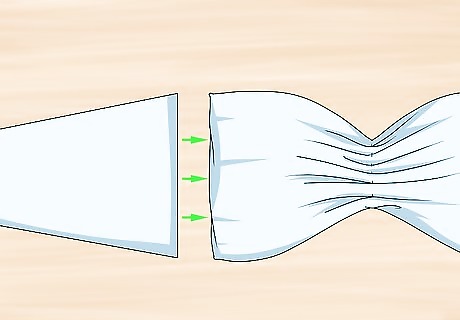
Line the left and right back ties with the same fashion fabric. The back ties will be self-lined. With right sides together, pin the back ties and the self-lining pieces together along the edges. Sew a ⁄8 in (0.32 cm) seam along the long end of the triangle, as well as the hypotenuse, with a machine zigzag stitch. Turn them both out so the right sides face outwards. Do not sew the short sides together at this point.
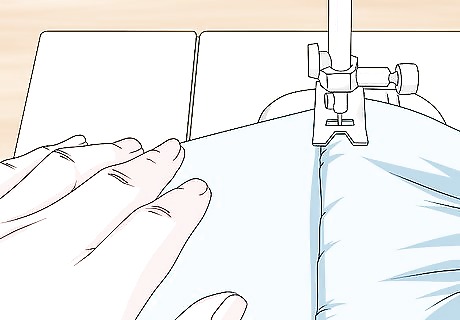
Sew the back ties to the sides of the bikini top. With right sides together, pin the left and right back ties to the left and right sides of the bikini top. When positioned upright, the back ties should taper downward to a “V.” Machine zigzag stitch the two straps onto the bikini top front.
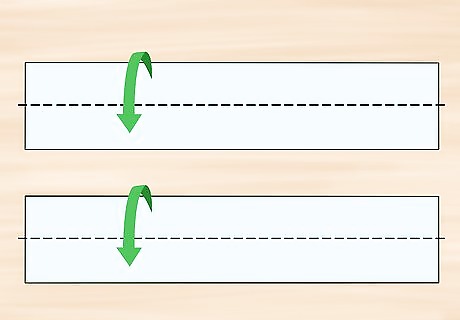
Fold the halter straps in half and pin. Fold the right sides of each halter strap together lengthwise. Pin in place so that the edges meet up.
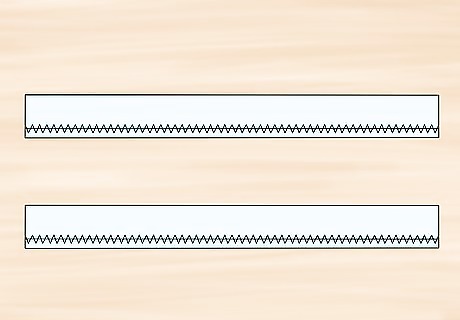
Zigzag stitch the straps and turn them out. Sew a machine zigzag stitch ⁄8 in (0.32 cm) away from the cut edge, down the long edge of each strap on the machine. Turn them right-side out once they're sewn up. Sew one of the short ends closed (the tapered one if you've chosen to do this) and leave the other end open.
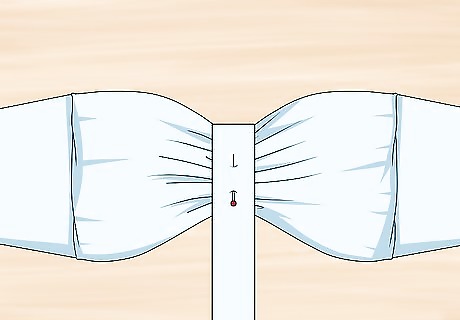
Pin the halter straps in place while trying on the bikini top. Once you have the back ties knotted and the bikini top front positioned comfortably across your bust, pin the halter straps in a comfortable place along the top edge of the bikini top. Remove the top and re-pin the straps so that the right sides are together.
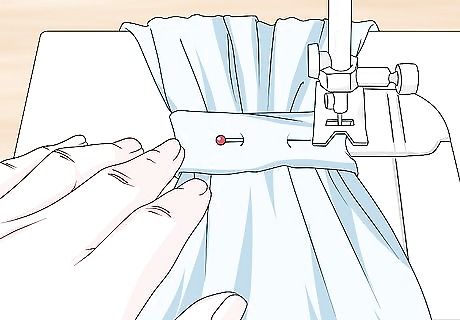
Sew the halter straps to the bikini top. With right sides together, zigzag stitch the straps onto the top edge of your bikini top. Do this ⁄8 in (0.32 cm) below the finished edge of the bikini top. You may want to do a few passes of machine stitches to make sure the straps will be secure. This completes the top half of your bikini. If your bikini has separate straps to tie the top and bottom you can make it from the excess fabric or you may use decorative ribbon or ties or even metal rings.
Marking and Cutting out the Bikini Bottoms
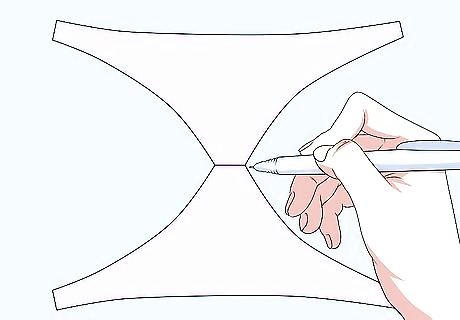
Trace the outline of another pair of bikini bottoms. Untie or cut apart the old bottoms at the sides, so that the entire piece lies flat. Pin the piece in place onto the wrong side of your fashion fabric, then trace its outline. Then, trace it again on the wrong side of the lining fabric. If you don't have an old pair of bikini bottoms, you can use panties that you don't mind cutting apart. Make sure your reference bottoms fit well and that they cover as much skin as you want your new bikini bottoms to cover. If they're too small or the cut is wrong, increase the size when drawing the outline to achieve a better fit.
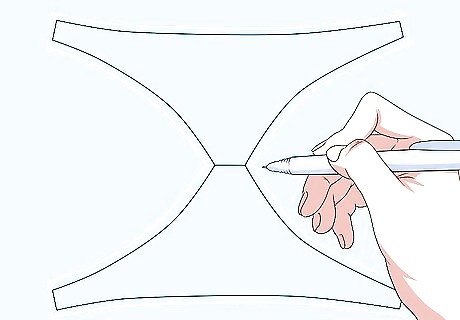
Mark ⁄4 in (0.64 cm) seam allowance around the pattern piece. With a ruler, mark out ⁄4 in (0.64 cm) seam allowance around the perimeter of the shape you just drew This will provide you with enough seam allowance for both your outer fabric and lining fabric.
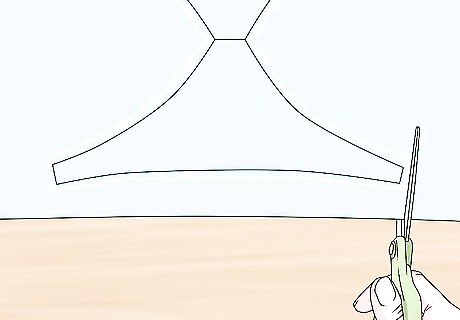
Cut out the bikini bottom pieces. Use fabric scissors to cut out the bikini bottom piece from your outer fabric and lining. Be sure to cut along the outside lines to include the seam allowance. Try not to stretch out or snag the fabric while cutting it out.
Sewing up the Bikini Bottoms with Elastic
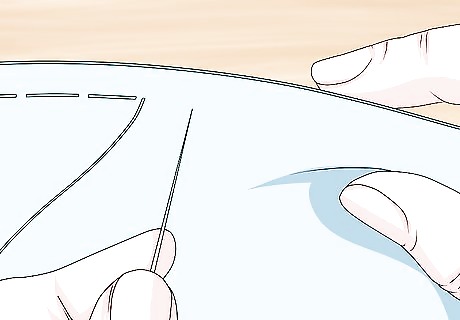
Pin and baste the lining to the fashion fabric, wrong sides together. Straight stitch the pieces in place on your machine, ⁄2 in (1.3 cm) away from the cut edge on all sides. Use a long basting stitch that you will later remove. The basting stitch is useful for holding all of the pieces together but isn't necessary for the finished garment. Use a contrasting color for the basting stitch so that it's easy to see when you go to remove it later.
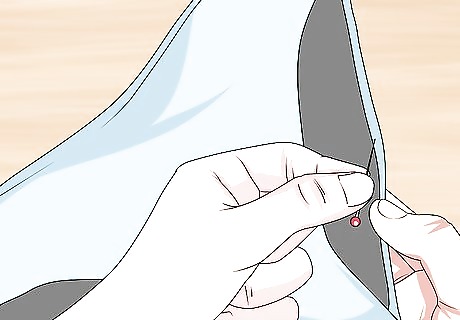
Pin elastic into the lining side of both leg openings. Measure 2 lengths of ⁄4 in (0.64 cm) wide cotton swimwear elastic that are about 2 in (5.1 cm) shorter than the entire leg opening. On one leg opening, align the edge of an elastic piece with the cut edge of the fabric and pin in place. The elastic should be tighter on the back side of the bikini bottoms so that it will stay in place around the back of your body. Repeat so that both leg openings have elastic. The elastic needs to be slightly shorter than the leg opening so it stays secure and creates the right shape. You can adjust this to your preferences by using a longer or shorter piece of elastic. When pinning, place one pin at each end, and one in the center, leaving a little less elastic in the back than in the front. Then, place pins at the halfway points between the existing pins until the whole piece of elastic is positioned securely.
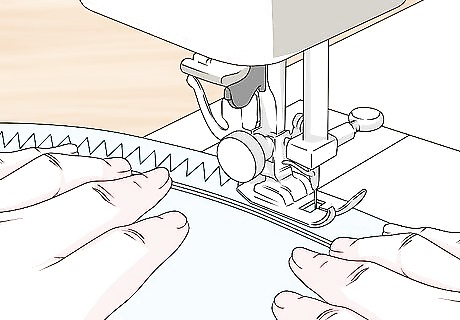
Zigzag stitch the elastic into the leg openings. Keep the edges of the outer fabric, lining, and elastic lined up and hold the pieces taught while you run them through the machine. You'll probably need to stretch out the elastic slightly so that it lies flat on top of the fabric. Do this for the right and left leg openings.
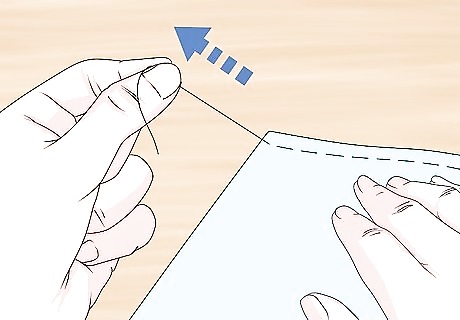
Pull out the basting stitches. Remove the straight basting stitches with a seam ripper. Make sure that all traces of the basting stitches are taken out, and be careful not to snag the fabrics while you do this. Discard the basting threads.
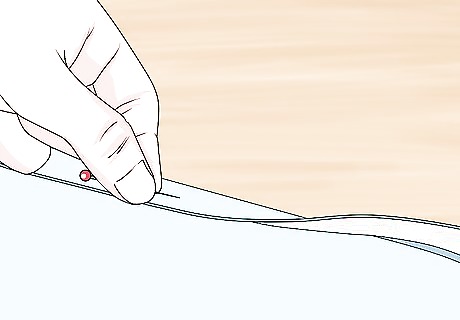
Fold and pin the elastic and seam allowance towards the inside at the leg openings. Fold the entire width of the elastic once over, towards the inside of the bikini bottoms. The seam allowance on the outer fabric should completely cover up the elastic. Pin this in place along the leg openings.
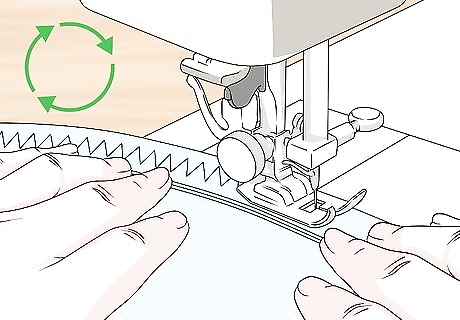
Finish the leg openings with a zigzag stitch. On the machine, sew around the folded-over leg openings with a zigzag stitch, pulling the elastic taut and flat so that it lies smoothly against the fabric. This will create the finished and well-fitting hem for your bikini bottoms.
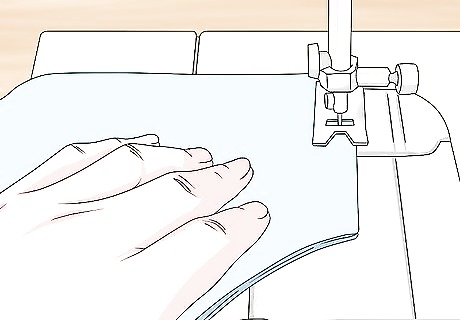
Close up the bikini bottom sides. Fold the bikini bottoms in half, right sides together, and match up the front and back pieces on the right and left sides. Stitch up the sides using a zigzag machine stitch at ⁄4 in (0.64 cm) seam allowance.
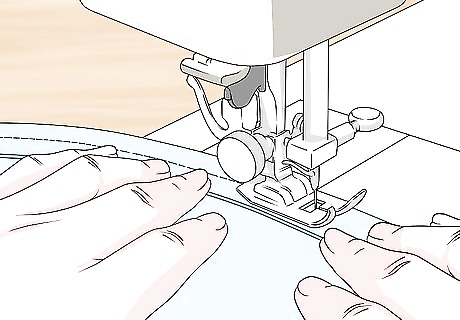
Hem the top edge. Fold the top edge of the bikini bottoms toward the inside by ⁄4 in (0.64 cm). Pin in place and sew on the machine with a zigzag stitch. Now you have a one of a kind two-piece bikini to wear next time you hit the beach!
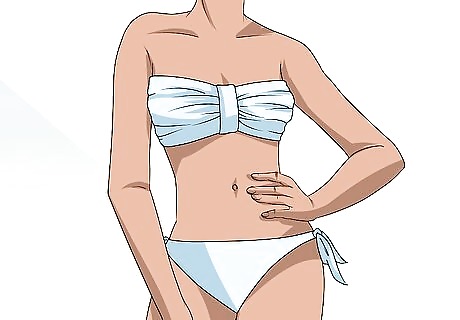
Finished.










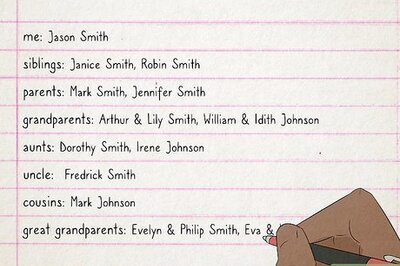



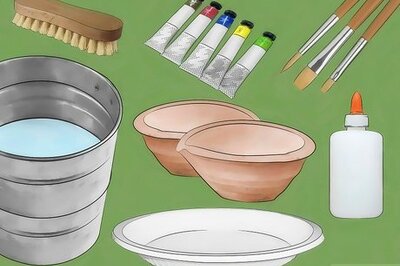


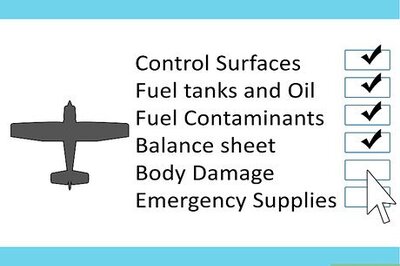
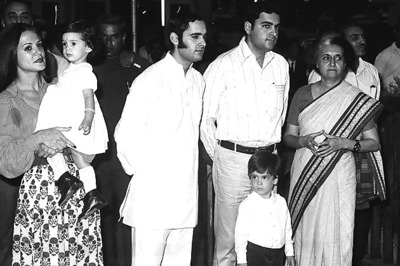
Comments
0 comment